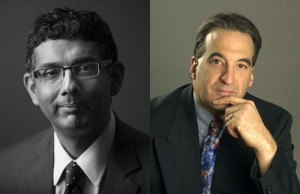 Writing for PJ Media, Walter Hudson, a Christian, offers a good summary of key differences between Christianity and Objectivism, the secular philosophy of Ayn Rand. Hudson previews topics likely to be debated tonight in Austin, Texas, when Christian Dinesh D’Souza and Objectivist Andrew Bernstein square off over the question, “Christianity: Good or Bad for Mankind?”
Writing for PJ Media, Walter Hudson, a Christian, offers a good summary of key differences between Christianity and Objectivism, the secular philosophy of Ayn Rand. Hudson previews topics likely to be debated tonight in Austin, Texas, when Christian Dinesh D’Souza and Objectivist Andrew Bernstein square off over the question, “Christianity: Good or Bad for Mankind?”
Access to the Livestream presentation of the debate can be purchased for $5 here; the debate starts at 7p.m. CST.
In his preview, Hudson briefly discusses four main areas (broken into five points): the source of knowledge, the nature of reality, the justification for ethics, and the history of Christianity. Here I will address only the first three issues; Bernstein’s essay on the Dark Ages addresses the essentials of the third.
Regarding knowledge, Hudson points out that the “Christian worldview . . . allows for revelation from a supernatural source.” Indeed, not only does Christianity (and every religion) allow for revelation or faith, it depends on it. Objectivism, on the other hand, holds that all knowledge derives from the evidence of the senses and logical inference from that evidence. (Hudson correctly summarizes this, except he refers to the process merely as “deduction” when logic consists primarily in induction and secondarily in deduction.)
Regarding reality, Hudson explains, Christianity holds that God exists in a supernatural dimension, whereas Objectivism holds that there is only one reality, the natural world, the world in which we live.
Regarding ethics, Hudson correctly notes that Rand rejects “original sin” and self-sacrifice, advocating instead rational self-interest. Hudson writes that according to Rand “altruism is not merely caring for others. . . . In Rand’s view, altruism is irrationally living for others at the expense of self, and egoism is living intentionally in service of rational long-term self-interest.” That’s essentially correct, but the implication that one might rationally live for others is contrary to Objectivism. Rand held that each individual properly lives for himself and that doing so involves dealing with others in ways that are good for one’s life, such as treating others justly, respecting their rights, and developing deep bonds of friendship and love.
On the issue of ethics, Hudson makes a confusing comment in claiming that, for Rand, “The concept of sin is unceremoniously rejected by a metaphysics which denies the existence of any god we need to live up to.” Certainly Rand did not conceive of “sin” in relation to a god or a supernatural dimension. However, Rand recognized absolute right and wrong, good and bad; she held, “that which furthers [one’s] life is the good, that which threatens it is the evil.”
Oddly, despite his largely accurate portrayal of Rand’s philosophy (unusual in the media, where we often see only smears and misrepresentations of her work), Hudson believes that Christianity and Objectivism “are not . . . wholly irreconcilable.” Hudson even says that in a future essay he will reveal a “Christian virtue of selfishness.”
However, ultimately these issues are either/or: Either reason is man’s means of knowledge, or it is not; either faith begets knowledge, or it doesn’t; either the natural world is all there is, or not; either the individual should live for himself, or he shouldn’t.
Still, it is refreshing to read a basically accurate and respectful review of Rand’s ideas from someone who disagrees with the fundamentals of those ideas.
If you are interested in these issues, be sure to sign up for the Livestream of the debate tonight; it promises to offer plenty for Christians, atheists, and Objectivists alike.
Like this post? Join our mailing list to receive our weekly digest. And for in-depth commentary from an Objectivist perspective, subscribe to our quarterly journal, The Objective Standard.
Related:
- The Tragedy of Theology: How Religion Caused and Extended the Dark Ages
- Andrew Bernstein on Religion vs. Morality
- Atlas Shrugged and Ayn Rand's Morality of Egoism


![[TEST] The Objective Standard](https://test.theobjectivestandard.com/wp-content/uploads/2017/10/logo.png)









